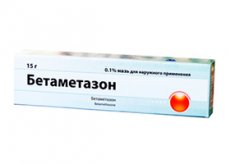Medical expert of the article
New publications
Preparations
Betamethasone
Last reviewed: 03.07.2025

All iLive content is medically reviewed or fact checked to ensure as much factual accuracy as possible.
We have strict sourcing guidelines and only link to reputable media sites, academic research institutions and, whenever possible, medically peer reviewed studies. Note that the numbers in parentheses ([1], [2], etc.) are clickable links to these studies.
If you feel that any of our content is inaccurate, out-of-date, or otherwise questionable, please select it and press Ctrl + Enter.

Betamethasone has anti-inflammatory, anti-allergic and antipruritic properties.
Indications Betamethasone
It is used to reduce inflammation in dermatitis (including photodermatitis) and eczema, as well as nodular pruritus, lichen planus, diuretic dermatitis, neurodermatitis and erythroderma, as well as thyroid dermopathy and Oppenheim-Urbach disease.
It is also prescribed for the treatment of psoriasis on the skin under the scalp and other types of psoriasis, excluding the extensive form of plaque psoriasis.
Pharmacodynamics
Betamethasone is a GCS drug, it blocks the processes of leukocyte movement, the appearance of lysosome enzymes in the intercellular space, as well as anti-inflammatory mediators at the site of inflammation. In addition, it inhibits phagocytosis, strengthens vascular strength and prevents the appearance of edema in the area of inflammation.
Pharmacokinetics
After local treatment of the affected area with cream in therapeutic doses, the absorption of the drug into the blood through the epidermis is very weak - 12-14%. Synthesis with blood protein is 64%. Participates in the processes of liver transformation.
Excretion of the drug occurs through the kidneys (mostly in the form of decay products), and only a small part is excreted in the bile.
Absorption of betamethasone is enhanced by inflammation or damage to the epidermis, as well as by the use of tight dressings.
Dosing and administration
The cream should be applied locally. The dosage regimen is selected individually for each patient.
A thin layer of cream is applied to the affected area of the epidermis twice a day, gently rubbing it in. When symptoms of improvement appear, the frequency of use of the drug can be reduced to 1 time per day. The duration of therapy is determined by the rate at which inflammation disappears, itching passes, and the epidermis is cleansed. In addition, the duration depends on the type of pathology and the degree of its severity. Often, the treatment cycle lasts 1-2 weeks. A repeat course can be carried out after at least 3 weeks have passed since the end of the previous one.
Children or people with lesions of the epidermis on the face can use the medicine for a maximum of 5 days.
Use Betamethasone during pregnancy
The use of Betamethasone during lactation or pregnancy is permitted only if there are vital indications and taking into account possible complications.
Contraindications
Main contraindications:
- skin lesions of fungal, bacterial or viral origin;
- cutaneous tuberculosis;
- epidermal manifestations of syphilis;
- skin symptoms resulting from vaccination;
- perioral dermatitis;
- acne;
- plaque psoriasis;
- itching in the perianal area or in the genital area;
- varicose veins;
- rosacea;
- the presence of hypersensitivity to the active element or other components of the drug.
Side effects Betamethasone
The use of the medicinal substance can lead to the following negative effects:
- skin lesions: prolonged use on one area may cause a burning sensation, irritation or dryness, as well as itching. Less common are acne, hyper- or hypopigmentation, folliculitis, dermatitis (contact or perioral form), hypertrichosis, cutaneous maceration or atrophy, secondary infection, telangiectasia, skin stretch marks and miliaria;
- General disorders: Cushingoid, adrenal suppression and decreased carbohydrate tolerance. In a child, adrenal suppression develops in the form of growth retardation, decreased weight, increased intracranial pressure, bulging fontanelle, decreased blood cortisol levels, optic nerve swelling and headache.
 [ 16 ]
[ 16 ]
Overdose
Long-term use of the cream on large areas of the epidermis causes the appearance of general negative symptoms characteristic of GCS: suppression of the function of the HPA system, complicated by the development of secondary adrenal insufficiency, as well as Cushingoid.
Symptomatic procedures are used for therapy. Electrolyte balance correction may also be performed.
Shelf life
Betamethasone is allowed to be used for 36 months from the date of release of the medication.
 [ 28 ]
[ 28 ]
Application for children
It is prohibited to prescribe to children under 2 years of age (except in cases with vital indications).
Children who received topical corticosteroids experienced growth retardation, adrenal suppression, increased ICP, poor weight gain, and development of Cushing's disease.
 [ 29 ], [ 30 ], [ 31 ], [ 32 ]
[ 29 ], [ 30 ], [ 31 ], [ 32 ]
Analogues
Analogues of the drug are Betliben, Akriderm, Beloderm Express with Betazone and Soderm, and in addition to this, Betamethasone valerate and Betamethasone dipropionate, as well as Celestoderm-B.
Reviews
Betamethasone gets good reviews - the ointment copes well with neurodermatitis, as well as allergic symptoms that appear on the epidermis. With strict adherence to the prescribed medical instructions and compliance with the dosage scheme, the development of negative symptoms is noted only sporadically.
Attention!
To simplify the perception of information, this instruction for use of the drug "Betamethasone" translated and presented in a special form on the basis of the official instructions for medical use of the drug. Before use read the annotation that came directly to medicines.
Description provided for informational purposes and is not a guide to self-healing. The need for this drug, the purpose of the treatment regimen, methods and dose of the drug is determined solely by the attending physician. Self-medication is dangerous for your health.

